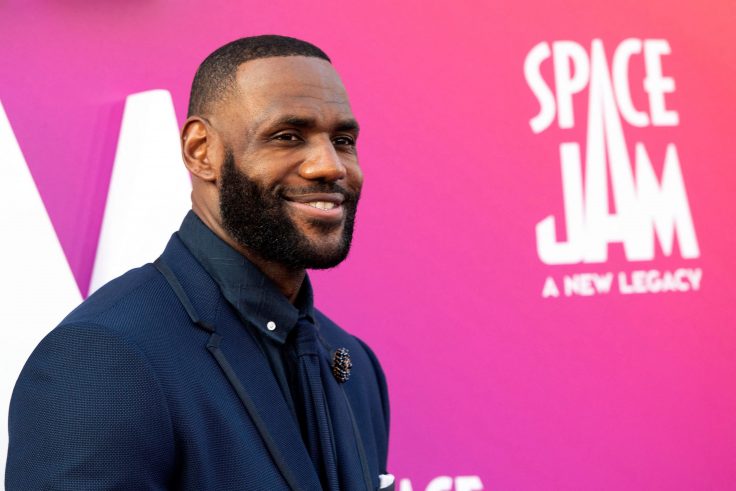Author’s note: You need to read this piece until the very end for some very important information you would never have known otherwise.
Space Jam 2 is a movie in the way "processed cheese food" is cheese. It wants you to like its surface and nothing else, the way fake cheese offers you a momentary spasm of flavor on your taste buds and nothing else. Everything about Space Jam 2 mimics another thing; it doesn’t have a single authentic moment or idea or joke or plot point of its own.
That’s not because it’s a remake/reboot/whatever of the 1996 Space Jam, in which Michael Jordan played basketball with Bugs Bunny and the Looney Tunes. The original Space Jam seemed like a promising candidate for updating because the original was so lousy almost anything new and different should have been an improvement. And the fact that the director of the new film was Malcolm D. Lee only heightened this expectation.
Lee is one of the most interesting and unheralded comedy directors of the past 20-odd years. His 2003 blaxploitation spy parody Undercover Brother is an unalloyed delight, as is The Best Man, his 1999 wedding-weekend Black Big Chill. In 2013, he made a sequel, The Best Man Holiday, which is not as good as the first but has the distinction of being the most unabashedly religious movie produced by a Hollywood studio in decades. More recently, his surprise smash hit Girls Trip featured an outrageously hilarious turn for the ages by Tiffany Haddish.
Surely Lee could do something interesting with the Space Jam conceit, borrowed wholesale from the astounding and original Who Framed Roger Rabbit—set in an alternate reality in which human beings and cartoons can coexist. The first one sure didn’t. It took the wittiest and most culturally sophisticated American cartoons and cartoon characters and made them witless and unfunny—annoying supporting characters in the tiresome glorification of the wonders of Michael Jordan.
This time it’s LeBron James who is playing basketball with the Looney Tunes. And while James turns out to be more natural and comfortable on camera than Jordan was, this is grading on a curve in a big way. I’m not a basketball fan these days but I’m pretty sure James didn’t become the biggest star in the game through his charm, because based on this movie, he doesn’t seem to have much. To be fair, he plays himself as kind of a jerk; he’s an overly demanding and humorless father who drives his son away and into the arms of… a Warner Bros. algorithm, which serves as the villain of the piece. This vainglorious and deranged computer entity is played by an almost insanely miscast Don Cheadle, an actor whom I would have thought incapable of giving a bad performance until I was forced to witness this horror.
To give you a sense of just how lamely derivative Space Jam 2 is, the plot conflict between LeBron and his son Dom (not his real child) seems entirely taken from Hook, in which Robin Williams’s Peter Pan character has forgotten his time in Neverland and is a workaholic meanie, which gives Dustin Hoffman’s Captain Hook an opening to steal Peter’s son from him. Hook is an unrelievedly terrible movie and universally considered one of the dark stains on Steven Spielberg’s career. Why would you steal its plot?
Anyway, the algorithm traps the Jameses inside the server wherein the Looney Tunes reside—and for LeBron to save his son, he must recruit the Looney Tunes to play a basketball game against… oh, forget it. The audience for the game is made up of real people who have also been removed from Earth and brought to the server for no particular reason, as well as hundreds of only momentarily glimpsed characters from the history of Warner Bros. intellectual property. Among them: The Night King from Game of Thrones, King Kong, Dumbledore, and the Penguin from Batman Returns. This is the movie’s one clever touch, so of course it’s thrown away and wasted.
So it turns out that Malcolm D. Lee became the movie’s director a month into filming when the original helmer was fired. This means there was nothing he could do to fix it. There never is in these situations. Replacing a director in the middle of production is almost invariably the mark of doom. (It certainly was when the original team of directors of Solo was superseded by Ron Howard.) Only once in movie history did such a production score a triumph, and that was Gone with the Wind. The original director, George Cukor, was dismissed in favor of Victor Fleming. It was said Clark Gable insisted upon it because Cukor was gay and Fleming was a man’s man.
More recent speculation suggests that Gable, who was quite the piece of work—he date-raped Loretta Young, who had the baby, gave it to an adoption agency, then adopted her own baby and didn’t tell Judy Young she was her actual mother and Gable her rapist-father until Judy was in her 20s—wanted Cukor out for another reason. There’s evidence he had been a male prostitute in L.A. in the 1920s, that one of his customers had been a Cukor friend named Billy Haines, and he knew Cukor knew, and wanted to keep as far away from Cukor as possible.
See? Aren’t you glad you kept reading this piece until the end?
Th-th-that’s all, folks!
